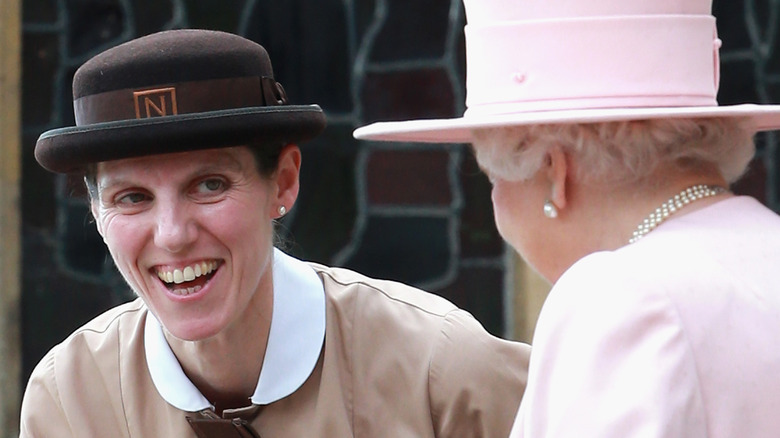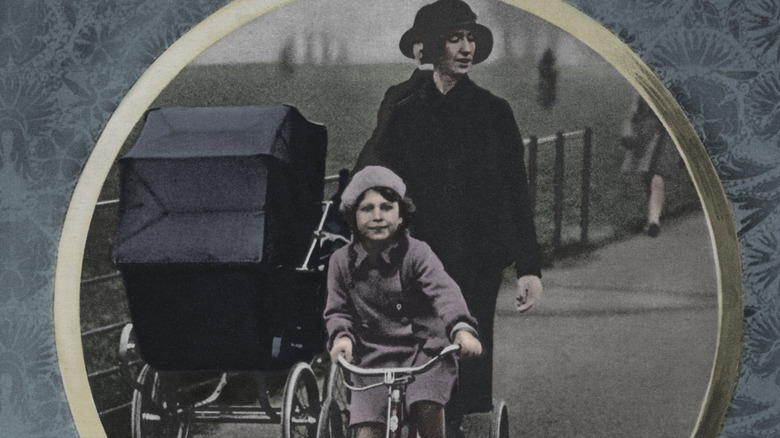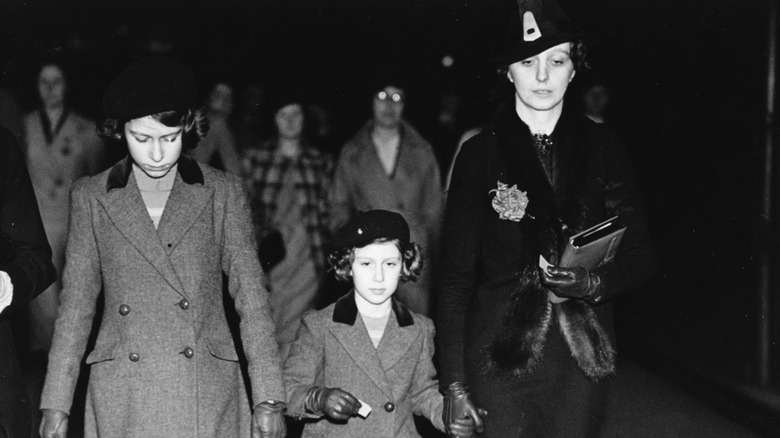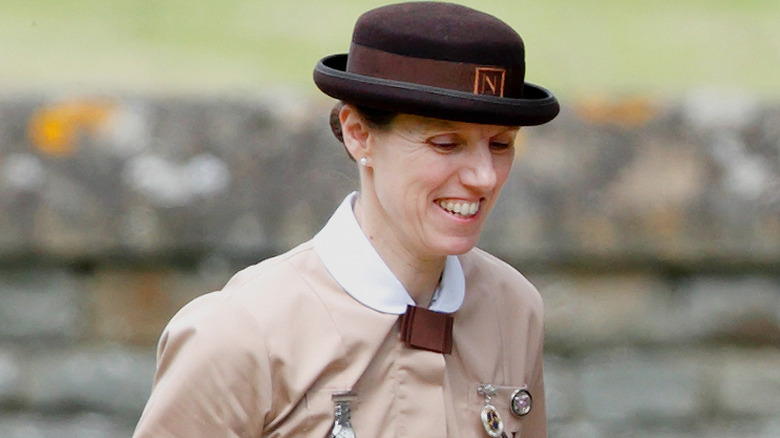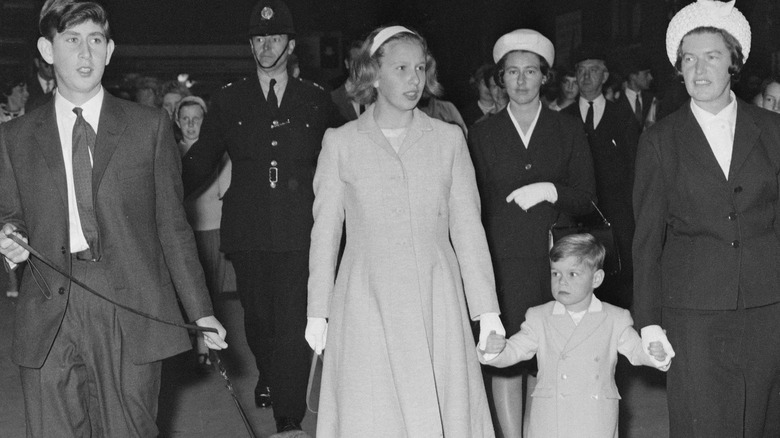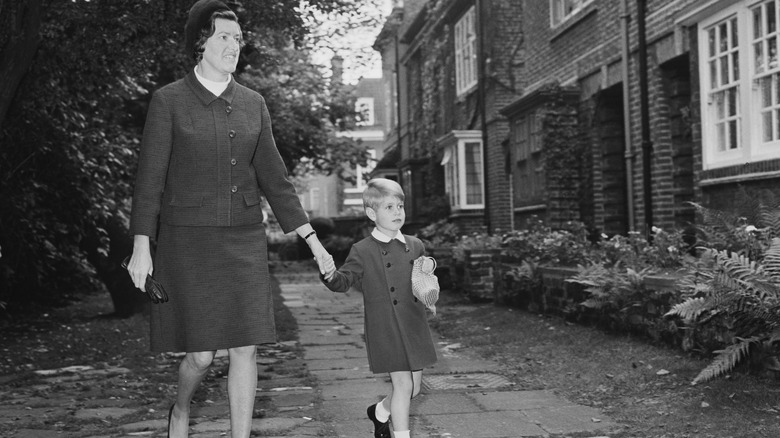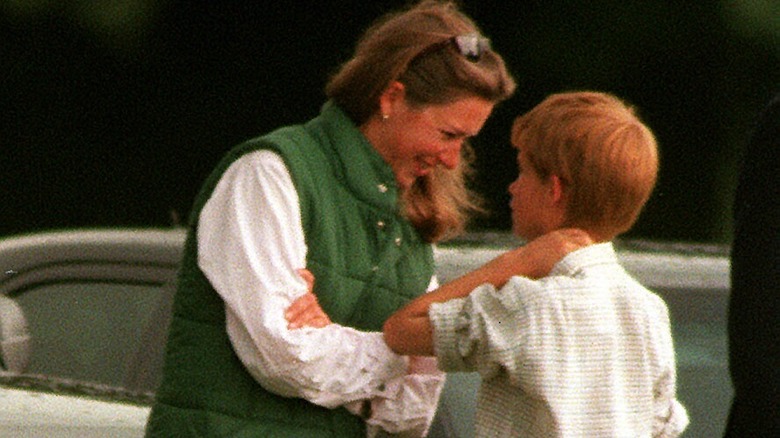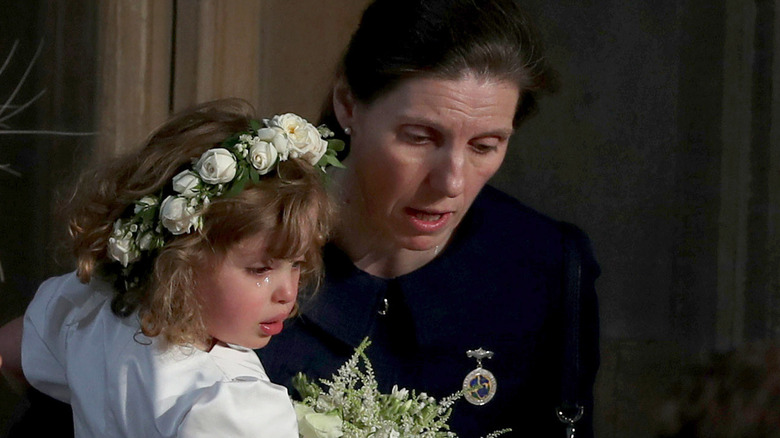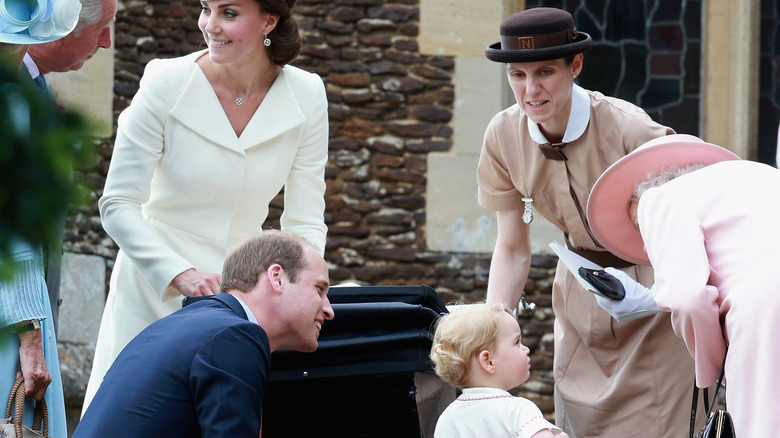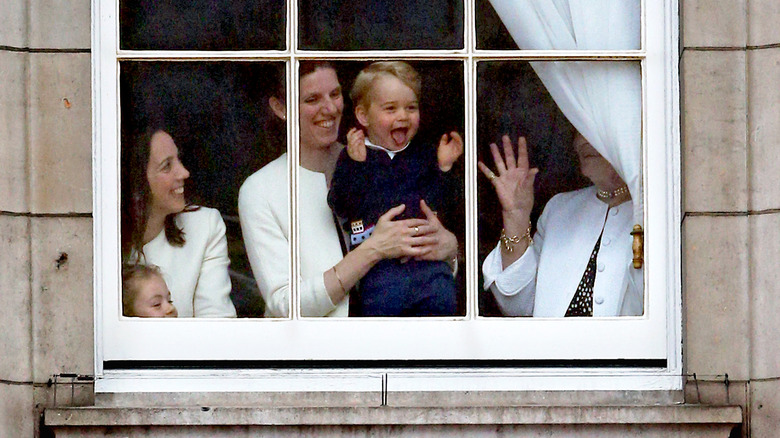Rules Royal Nannies Have To Follow
It's no secret that the British royal family asks its staff to follow intense rules. After all, much of royal life unfolds according to traditional protocol. According to the documentary "Secrets of the Royal Servants" (via Express), part of this protocol means that the palace cleaning staff is banned from vacuuming the floors. Instead, they must resort to old-fashioned sweeping, presumably to avoid disturbing the royals with the hoover's loud roar. Additionally, as reported by the Mirror, some lower-status staff members are even required to walk on the very edges of the hallway in what is referred to as the "slow lane."
Beyond the decades-old protocol that guides day-to-day interactions at Buckingham Palace, there are other rules that staff members have to follow based on the individual preferences of certain royals. One of the most notoriously finicky members of Britain's most famous family is King Charles III, who is known for asking his staff to do what some would consider ridiculous jobs. For example, in the documentary "Serving the Royals: Inside the Firm" (via GoodtoKnow), former royal butler, Paul Burrell, claimed the king subjected his staff to a number of unusual personal requests. One of these was to reportedly iron his shoelaces every morning.
Like other members of the palace staff, royal nannies must adhere to strict protocol, dictating everything from the words they use to when they can marry. They must also, however, cater to the individual whims of the royal mothers that they serve.
Don't get married before the princess does
Many aspects of royal protocol are passed down from one generation to the next. However, not all of these guidelines survive the test of time. According to History, Queen Elizabeth's caregiver, Marion Crawford, was subject to a strange rule that prevented her from choosing when she could get married. As per the outlet, the Scottish governess was only 22 years old when the future Queen Mother selected her to care for then-Princess Elizabeth and Princess Margaret. Over the years, Crawford — or "Crawfie" as the princesses affectionately nicknamed her — created a close bond with the girls. However, she was, in many ways, forbidden from living a life of her own.
As revealed by History, Crawford faced particularly strict restrictions when it came to her romantic life. Apparently, she was not allowed to get married to her long-time boyfriend, as royal protocol dictated that she could only marry after the future Queen Elizabeth did. She also could not exit palace life to live elsewhere until the princesses signaled that they were ready for her to go. Once the princesses reached their late teens and early 20s, Crawford may have expected to move on. However, she was bound to her role as the girls' caretaker until 1947 when then-Princess Elizabeth got engaged to Prince Philip. It was in that same year that Crawford, at the age of 38, was finally permitted to marry her husband, George Buthlay (via The Scotsman).
Defer to senior royals on matters of privacy
Thanks to the palace's no-marriage rule, Queen Elizabeth's governess, Marion Crawford, chose royal duty over personal happiness. Nonetheless, she eventually became a persona non grata. As reported by Express, the nanny's downfall began when she was approached by an American publisher. The publisher reportedly asked if Crawford could participate in a journalistic project that would focus on the royal children's upbringing. Apparently, senior royals weren't completely against the idea.
According to personal letters obtained by The Observer (via The Guardian), the Queen Mother supported Crawford's collaboration with the press, based on two conditions. Firstly, she asked the nanny to remain anonymous when providing any information for articles: "Mr. Morrah [the journalist], who I saw the other day, seemed to think that you could help him with his articles and get paid from America. This would be quite all right as long as your name did not come into it." And, for another, the Queen Mother forbade the nanny from ever publishing anything of her own: "I do feel, most definitely, that you should not write and sign articles about the children."
Unfortunately, as noted by History, the nanny broke both rules. Crawford's name ultimately appeared in the American article series, and she also went on to write a tell-all book called " The Little Princesses" about her time raising Princess Elizabeth and Margaret. As a result, Crawford was evicted from her home at Kensington Palace and never reconciled with the royal family.
Do not speak to the press
Although royal nanny Marion Crawford was initially allowed to work with a journalist on an article about Queen Elizabeth's upbringing, the result was disastrous. As noted by History, Crawford embarrassed the royal family by informing the press about the former King Edward and his controversial wife, Wallis Simpson. Even worse, the nanny's collaboration with publishers gave her the contacts to launch her 1950 tell-all memoir "The Little Princesses." The book represented such a betrayal to the royal family that they use the phrase "doing a Crawfie" to mean "selling out the family" (via Express). Thus, current royal nannies can no longer engage with the press.
Unfortunately, however, the royal family doesn't always trust nannies to be close-lipped out of the goodness of their hearts. As royal expert Katie Nicholl revealed in an interview with ET, Prince Harry and Meghan Markle asked Archie's nanny to formalize her promise of discretion via paperwork. "I've heard from very reliable sources that the new nanny who has been appointed by the Sussexes has had to sign quite an extensive non-disclosure agreement," Nicholl divulged.
It remains unconfirmed whether or not Prince William and Princess Catherine have enforced a similar rule with their nanny, Maria Borrallo. However, the Daily Record reports that the couple enforces a general "no gossiping" rule in their household. When hiring staff, the Wales family reportedly looks for candidates capable of "maintaining confidentiality and exercising discretion."
Do create a good rapport with the children
Historically speaking, royal nannies often took on the role of raising the princes and princesses while royal parents performed their official duties. This was certainly the case in King Charles' upbringing. The monarch spent so much time with the nursery staff that when he was a baby, his first word was not "mama" but rather "nana" — a reference to his nanny (via Time). Although this interaction might seem unusual by modern standards, it used to be typical in royal circles. As royal historian Robert Lacey told Town & Country, Queen Elizabeth didn't find her children's attachment to their nannies odd since "she had been brought up in that style herself, after all, with her parents leaving her at home and entrusting her entire schooling to a governess and home tutors."
Because of the unique nature of this relationship, King Charles' nanny, Mabel Anderson, had to build a rapport with him. According to the biography "The King: The Life of Charles III" by royal expert Christopher Andersen (via Page Six), Mabel Anderson's efforts were overwhelmingly successful. As the royal expert wrote, the nanny "was the only human being allowed to take needle and thread to Prince Charles' teddy bear." Apparently, King Charles entrusted his former caretaker with this task well into adulthood, even after reaching his 40s. The long-lasting nature of this relationship goes to show that Mabel Anderson did ultimately manage to earn the future king's deepest affection.
Don't be rude to other members of the staff
While King Charles developed a close relationship with his nanny, Mabel Anderson, not all members of his nursery staff were equally beloved. According to an obituary published in a 1987 edition of the Los Angeles Times, one of then-Prince Charles' nannies was actually fired. Per the outlet, Helen Lightbody began directing the palace nursery in 1948 when the prince was only a few weeks old. She reportedly remained in her position for eight years until 1956, when Queen Elizabeth dismissed her over a disagreement about sweets.
The Los Angeles Times obituary claims that Lightbody was fired for restricting Prince Charles' dessert. However, other reports view her dismissal differently. Some even claim that Lightbody broke a sacred palace rule by being rude to other staff members. In his book "Long Live the Queen: 13 Rules for Living from Britain's Longest Reigning Monarch" (via MyLondon), royal expert Bryan Kozlowski wrote that Lightbody's downfall was applying the same level of severity that she used with the children to the rest of the royal staff.
Kozlowski explained: "It's said she took pleasure in tormenting the Palace kitchen with her exacting standards." In practice, this meant that Lightbody was too controlling when it came to the prince's food. Per Kozlowski's research, "dishes for young Charles were constantly being refused or remade based on little more than the nanny's personal whims." This behavior offended the kitchen staff, broke protocol, and ultimately cost Lightbody her job.
Respect the mother's role in the family
Royal nannies often formed close bonds with the children they raise (via Town & Country). However, as noted in Express, modern royal mothers, like Princess Diana, Princess Catherine, and Meghan Markle, have tended to take a more hands-on approach to parenting. In these cases, nannies must not overshadow royal mothers. Not all nannies, however, have managed to do so.
One of the most famous examples of this phenomenon was Alexandra Legge-Bourke, who nannied Prince William and Prince Harry. Legge-Bourke, or "Tiggy," as she was dubbed by the princes, was first hired in 1993 (via Town & Country). However, Tiggy eventually broke protocol by fostering a competitive relationship with Princess Diana, rather than a collaborative one. She even publicly asserted herself as the better caregiver, declaring, "[Diana] gives [her children] a tennis racket and a bucket of popcorn at the movies ... I give them what they need at this stage: fresh air, a rifle and a horse" (per The Guardian).
Unfortunately, Tiggy's attitude earned her an enemy in the prince's mother. As per Town & Country, Princess Diana contacted then-Prince Charles in 1996 saying that Tiggy should "not spend unnecessary time in the children's rooms... read to them at night, nor supervise their bathtime." A Mirror piece from the same year (via The Free Library) also alleged that Princess Diana forbade Tiggy from appearing in photos with the boys.
Don't call the children 'naughty' or 'kids'
Some rules — like staying away from the press — are universal throughout the royal family, but others vary from one household to the next. In Prince William and Princess Catherine's home, for example, it's likely that their nanny, Maria Borrallo, is forbidden from using certain terms in front of the children. As reported by the Mirror, one word that has almost certainly been eliminated from Borrallo's vocabulary is "kids." According to the outlet, this unusual rule stems from Borrallo's education at the world-renowned nannying institution, Norland College, where students are prohibited from uttering this word.
Interestingly, there is a reason for this restriction. In an interview with The Telegraph, Julia Gaskell, the head of training at Norland College explained: "We ask Norlanders not to say 'kids' and instead to say 'children' because 'kid' is a word for a baby goat." Apparently, referring to a child in such terms could be impolite. "We try and teach our Norlanders that children deserve to be treated with respect, and using the proper word for them, which is 'children,' is part of that," Gaskell clarified.
In the same interview with The Telegraph, Gaskell also revealed that nannies like Borrallo are banned from calling a child "naughty." In her view, this sort of name-calling fails to teach children what they did wrong. "We wouldn't want a Norland nanny to call a child naughty. We encourage them to label the behaviour, not the whole child," Gaskell elaborated.
Shouting at the children is off-limits
Prince William and Princess Catherine's household ban on certain words is not the only rule that they enforce in their home. The Sun reports that the couple maintains a "no shouting" policy under their roof, thanks to the support of their nanny, Maria Borrallo. Interestingly, this rule doesn't just apply to the adults doing the disciplining, but also to the children themselves. "Shouting is absolutely 'off limits' for the children and any hint of shouting at each other is dealt with by removal," according to a royal insider (via The Sun). The anonymous source went on to explain that, while Maria is "firm" with the little royals, she refrains from using disciplinary tactics like the naughty chair.
Notably, Prince William and Princess Catherine's "no shouting" rule corresponds well with the parameters that Maria Borrallo studied at Norland College. In an interview with The Telegraph, Norland training director, Julia Gaskell revealed that the vast majority of nannies from the college refrain from raising their voices with their charges. "We wouldn't want our Norlanders to shout at children," Gaskell revealed. Per the training director, this has to do with the history of the nannying institution itself: "Emily Ward, who set up Norland in the 1800s, banned the smacking and corporal punishment of children. Back then, that was really unusual and controversial." These days, Norland nannies continue this long tradition of respecting the children that they care for through gentle language.
Keep the kids' lives as normal as possible
Over the years, one royal nanny rule has remained constant — nannies should try to keep the children's lives normal. This was even true during Queen Elizabeth's childhood, when her nanny, Marion Crawford, exposed the young princess to life beyond the palace. Crawford even took the young Princess Elizabeth grocery shopping at Woolworths (via History). She also organized a Girl Guide group for young royals to have a taste of typical, childhood activities.
Compellingly, more recent nannies have continued this tradition. For example, Maria Borrallo, nanny to Prince George, Princess Charlotte, and Prince Louis, creates a sense of normalcy for the kids by occasionally stepping back. The Sun reports that the Borrallo doesn't do the typical nanny duty of dropping the little royals off at school. Instead, she seems to create space for Prince William and Princess Catherine to participate. As an anonymous royal insider told the outlet, "both William and Catherine are very keen to do the school run."
Lorren Khumalo – Prince Harry and Meghan Markle's former nanny for son Archie – has also tried to give him elements of a normal upbringing. Speaking during the documentary "Harry & Meghan" (via the Daily Mail), Meghan Markle revealed that Khumalo carried Archie on her back in a Zimbabwean mud cloth. This more hands-on approach contrasts greatly with the royal tradition of, as royal expert Katie Nicholl put it to ET, "a team ... on-call to cater for [the child's] every whim."
